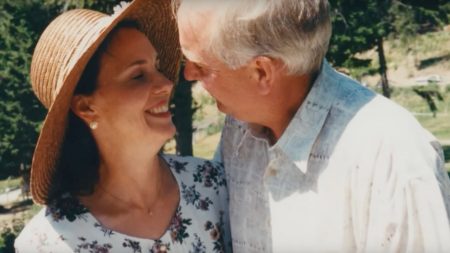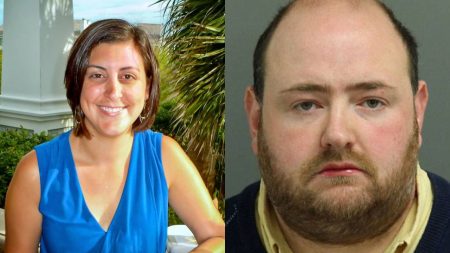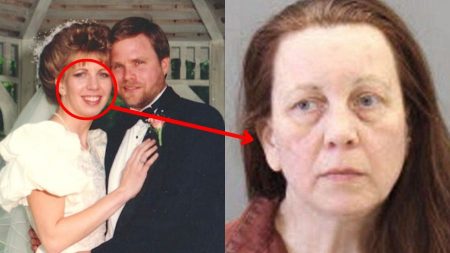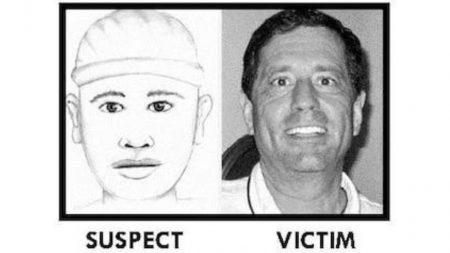Nikko Allen Jenkins, born on September 16, 1986, is a notorious figure known for his chilling criminal history.
Born in Colorado and raised in Omaha, Nebraska, Jenkins’ life took a dark turn as he descended into a world of crime and violence. His name has become synonymous with a series of brutal murders that shook the city of Omaha in 2013.
Jenkins’ upbringing was marred by a family background steeped in criminal activity, domestic violence, and substance abuse.
His early exposure to this life of dysfunction and crime set the stage for his own troubled journey.
Despite these early challenges, it was Jenkins’ belief in an ancient Egyptian deity, Apophis, that he claimed was the driving force behind his heinous acts.
Jenkins’ criminal history is marked by a series of violent crimes, culminating in a horrifying murder spree that took place over a two-week period in August 2013. During this time, Jenkins brutally ended the lives of four unsuspecting individuals in Omaha.
His victims included Juan Uribe-Pena and Jorge C. Cajiga-Ruiz, who were lured into a trap under the pretence of a sexual encounter, only to be shot in the head.
Curtis Bradford, a fellow inmate and friend of Nikko Jenkins, was shot twice in the back of the head. Lastly, Andrea Kruger, a mother of three, was forced off the road, shot four times, and left for dead.
Jenkins was eventually arrested and during his trial, he confessed to the murders, claiming they were sacrifices to the Egyptian god Apophis.
His trial was marked by erratic behavior and claims of mental illness, leading to a complex legal battle that ended with Jenkins being sentenced to death and an additional 450 years for weapons charges related to the murders.
As of now, Jenkins remains on death row, his case serving as a chilling reminder of the capacity for human violence. In this article, we will dive deep into the chilling story of Nikko Jenkins.
Table of Contents
- 1. Early Life and Background of Nikko Jenkins
- 1.1 Birth and Early Childhood of Nikko Jenkins
- 1.2 Family Background of Nikko Jenkins and Influence
- 1.3 Early Signs of Criminal Behavior
- 2. Criminal History of Nikko Jenkins
- 3. The Murders
- 4. Arrest and Trial
- 4.1 Details of Arrest of Nikko Jenkins
- 4.2 Confession and Trial Proceedings
- 4.3 Verdict and Sentencing
- 5. Mental Health and Beliefs
- 5.1 Jenkins’ Claims of Mental Illness
- 5.2 Psychiatric Evaluations and Findings
- 5.3 Jenkins’ Belief in the Egyptian God Apophis and Its Influence on His Actions
- 6. Family Involvement
- 6.1 Role of Family Members in the Crimes
- 6.2 Legal Consequences Faced by Family Members of Nikko Jenkins
- 7. Where is Nikko Jenkins Now?
- 8. Impact and Legacy
- 8.1 Impact of Nikko Jenkins on the Omaha Community
- 8.2 Influence on the Treatment of Mental Illness in the Criminal Justice System
- 9. Conclusion
- 10. FAQs
Early Life and Background of Nikko Jenkins
Birth and Early Childhood of Nikko Jenkins
Nikko Allen Jenkins was born in September 1986 in Colorado, United States. He spent his formative years in Omaha, Nebraska, where he was raised alongside his two sisters, Erica and Melonie.
His childhood was far from idyllic, marked by a turbulent family environment and early exposure to criminal activities.
Family Background of Nikko Jenkins and Influence
Jenkins’ family played a significant role in shaping his early life and possibly his future criminal tendencies.
His father, David A. Magee, had a criminal record that included multiple convictions, including terroristic threats, before his death in 2009.
His mother, Lori Jenkins, was indicted for being a felon in possession of ammunition in 2013.
The influence of his parents’ criminal activities was evident in Jenkins’ behavior from a young age.
The family environment, characterized by domestic violence and substance abuse, further contributed to his troubled upbringing.
This early exposure to a life of crime and dysfunction set the stage for Jenkins’ own descent into criminality.
Early Signs of Criminal Behavior
Jenkins displayed signs of criminal behavior from a very young age.
At just seven years old, he was detained for taking a gun to school.
This early incident was a clear red flag, indicating his potential for violence and criminal activity.
His criminal tendencies escalated as he grew older.
At the age of 15, Jenkins was sentenced to prison after a carjacking case.
He served 10 and a half years of a 21-year sentence. During his time in prison, Jenkins assaulted a guard on duty twice and participated in a prison riot.
These early signs of criminal behavior were indicative of the violent path that Jenkins would eventually follow, leading to his notorious murder spree in 2013.
Criminal History of Nikko Jenkins
First Criminal Activities and Imprisonment
Nikko Jenkins’ criminal history began at a young age. His first significant brush with the law occurred when he was only 15 years old.
He was involved in a carjacking case, which led to his first major sentence. Jenkins was sentenced to 21 years in prison for this crime, marking the beginning of his life within the criminal justice system.
His time in prison was far from uneventful. Jenkins exhibited violent behavior, assaulting a guard on duty on two separate occasions.
He also participated in a prison riot, further demonstrating his propensity for violence and disregard for authority.
Release from Prison and Start of Murder Spree
In July 2013, after serving 10 and a half years of his sentence, Jenkins was released from prison. However, his freedom was short-lived.
Within weeks of his release, Jenkins embarked on a horrifying murder spree that would shock the city of Omaha and make national headlines.
Over a two-week period in August 2013, Nikko Jenkins brutally murdered four individuals.
His victims included:
- two men lured into a trap with the promise of a sexual encounter,
- a fellow inmate with whom he had developed a friendship during their time in prison, and
- a mother of three who was forced off the road and shot multiple times.
Jenkins’ release from prison and subsequent murder spree raised serious questions about the effectiveness of the criminal justice system in rehabilitating offenders and protecting the public.
The Murders

Four Murders
In August 2013, Nikko Jenkins embarked on a terrifying murder spree that would leave four individuals dead in Omaha, Nebraska.
Over a span of two weeks, Jenkins brutally ended the lives of:
- Juan Uribe-Pena
- Jorge C. Cajiga-Ruiz
- Curtis Bradford, and
- Andrea Kruger
Detailed Account of Each Murder
1. Juan Uribe-Pena and Jorge C. Cajiga-Ruiz
The first victims of Jenkins’ murder spree were Juan Uribe-Pena and Jorge C. Cajiga-Ruiz.
On August 11, 2013, the two men were lured into a trap by Jenkins and two female family members. The women had deceived the men into believing they were interested in a sexual encounter.
Instead, they found themselves face-to-face with Jenkins, who shot both men in the head. Their bodies were later discovered in a white Ford truck near a city pool in Spring Lake Park.
2. Curtis Bradford
Curtis Bradford, a 33-year-old man who had served time in prison with Jenkins, was the next victim.
Jenkins and Bradford had developed a friendship during their time behind bars. However, this did not spare Bradford from Jenkins’ violent tendencies.
On August 19, 2013, Bradford was shot twice in the back of the head. His body was discovered outside a garage near the intersection of 18th and Clark Street.
3. Andrea Kruger
The final victim of Jenkins’ murder spree was Andrea Kruger, a 26-year-old mother of three.
On August 21, 2013, Jenkins forced Kruger’s car off the road as she was returning home from a late-night shift at work.
He then proceeded to shoot her four times before fleeing the scene. Kruger’s body was later found by a deputy sheriff responding to a report of gunshots.
Her vehicle was discovered abandoned in an alley approximately 12 miles away from the crime scene.
Arrest and Trial
Details of Arrest of Nikko Jenkins
Nikko Jenkins was arrested on August 30, 2013, on separate charges related to a terroristic threat.
However, this arrest would prove to be a turning point in the investigation of the four murders.
During his police interrogation, Jenkins confessed to the murders, providing chilling details of each incident.
Confession and Trial Proceedings
During his confession, Jenkins claimed that his actions were commanded by the ancient Egyptian deity, Apophis.
He believed that he was chosen to execute these killings to sow chaos and destruction in the world.
The trial against Jenkins began in April 2014, where he faced four counts of first-degree murder. Throughout the proceedings, Jenkins’ behavior was erratic and unpredictable.
He made extravagant claims about his connection to Egyptian deities and insisted on representing himself in court.
His mental state was a subject of concern, leading to multiple psychiatric evaluations to determine his fitness to stand trial.
Verdict and Sentencing
In 2014, Jenkins was found guilty on all four murder charges. However, due to lingering doubts about his mental health, the sentencing was delayed.
Extensive evaluations were conducted, with conflicting assessments from psychiatrists.
Some regarded his symptoms of mental illness as feigned or fabricated, while others diagnosed him with various disorders such as schizophrenia, bipolar disorder, and antisocial personality disorder.
Finally, in 2017, after years of legal battles and assessments, Jenkins was deemed mentally competent for sentencing.
The death penalty was imposed, making him the first person in Nebraska to receive this sentence since the reinstatement of capital punishment in 2016.
Additionally, he was handed a 450-year prison term for weapons charges related to the murders, including the use of a firearm during the commission of a felony and being a felon in possession of a firearm.
As of now, Jenkins remains on death row, his case serving as a chilling reminder of the capacity for human violence.
Mental Health and Beliefs
Jenkins’ Claims of Mental Illness
Throughout his trial, Nikko Jenkins made numerous claims about his mental health.
He insisted that he was suffering from severe mental illness, which he believed was the driving force behind his violent actions.
Jenkins’ erratic behavior during the trial, including his insistence on representing himself and his extravagant claims about his connection to Egyptian deities, raised concerns about his mental state.
Psychiatric Evaluations and Findings
Given Jenkins’ claims and behavior, multiple psychiatric evaluations were conducted to determine his mental health status and fitness to stand trial.
These evaluations resulted in conflicting assessments.
Some psychiatrists regarded his symptoms of mental illness as feigned or fabricated, suggesting that Jenkins was malingering to avoid a death sentence.
However, others diagnosed him with various disorders, including schizophrenia, bipolar disorder, and antisocial personality disorder.
Despite the conflicting assessments, in 2017, after years of legal battles and evaluations, Jenkins was deemed mentally competent for sentencing.
This decision was based on the conclusion that, despite his mental health issues, Jenkins was capable of understanding the charges against him and could assist in his defense.
Jenkins’ Belief in the Egyptian God Apophis and Its Influence on His Actions
One of the most chilling aspects of Jenkins’ case is his belief in the ancient Egyptian deity, Apophis.
Jenkins claimed that Apophis, the Egyptian god of chaos and destruction, had commanded him to commit the murders.
He believed that by executing these killings, he was fulfilling Apophis’ desire to sow chaos and destruction in the world.
This belief was not only a driving force behind his violent actions but also a significant factor in his self-mutilation.
Jenkins claimed to have cut his penis to resemble a serpent as an act of worship to Apophis. He also carved the word “Satan” across his face and attempted to slice his tongue to resemble a snake.
Jenkins’ belief in Apophis and his claims of mental illness added a complex layer to his case, raising questions about the intersection of mental health, religious beliefs, and criminal behavior.
Family Involvement
Role of Family Members in the Crimes
Jenkins’ family played a significant role in his crimes.
His mother, Lori Jenkins, and his sister, Erica Jenkins, were both directly involved in the murders.
Lori Jenkins was found to have concealed evidence related to the purchase of weapons used in the killings committed by her son.
She also assisted in disposing of clothing that contained gunshot residue.
Erica Jenkins, Nikko’s sister, was also deeply involved in the crimes. She was convicted of aiding him in the murder of his third victim, Curtis Bradford.
Furthermore, Erica, along with her cousin Christine Bordeaux, enticed and lured his first two victims, Juan Uribe-Pena and Jorge C. Cajiga-Ruiz, to their untimely deaths.
Another sister, Lori Sayles, faced charges in Bradford’s murder and was accused of concealing the murder weapon.
Nikko Jenkins’ remaining sister, Melonie Jenkins, has not been incarcerated. She provided testimony against Erica and faced charges related to several unrelated violent felonies.
Legal Consequences Faced by Family Members of Nikko Jenkins
The involvement of Jenkins’ family members in his crimes led to severe legal consequences.
Lori Jenkins, Nikko’s mother, was sentenced to an additional 5-6 years on top of her 10-year federal sentence for providing firearms to her son.
She is expected to be released from jail around 2028, at the age of 61.
Erica Jenkins, Nikko’s sister, is currently serving a life sentence at the Nebraska Centre for Women for her role in the murder of Curtis Bradford.
Lori Sayles, another sister, faced charges in Bradford’s murder and was accused of concealing the murder weapon.
Nikko Jenkins’ uncle, Warren Levering, received a 40-year sentence for aiding in the robbery and murder of Andrea Kruger.
His sentence was halved, leading to his release from an Oklahoma prison in 2020.
Where is Nikko Jenkins Now?
Status of Nikko Jenkins on Death Row
As of the latest updates, Nikko Jenkins remains on death row in Nebraska.
He was sentenced to death in 2017, becoming the first person in Nebraska to receive this sentence since the reinstatement of capital punishment in 2016.
In addition to the death sentence, Jenkins was handed a 450-year prison term for weapons charges related to the murders.
Despite his sentence, Jenkins has not yet been executed.
The state of Nebraska has faced numerous challenges in carrying out executions, including difficulties in obtaining the necessary drugs for lethal injection.
As a result, Jenkins continues to await his fate on death row.
Ongoing Legal Battles and Appeals
Jenkins’ case has been marked by numerous legal battles and appeals.
Following his sentencing, Jenkins filed a federal lawsuit claiming that his constitutional rights were violated due to his prolonged solitary confinement and the denial of adequate mental health treatment.
In addition, Jenkins has made several attempts to appeal his death sentence.
He has argued that he was not mentally competent at the time of his sentencing and that his rights were violated when the court refused to accept his guilty plea without a lawyer present.
Despite these appeals, Jenkins’ death sentence has been upheld. His case continues to navigate the complex legal system, serving as a stark reminder of the intersection of mental health and the criminal justice system.
Impact and Legacy
Impact of Nikko Jenkins on the Omaha Community
The crimes committed by Nikko Jenkins had a profound impact on the Omaha community.
The brutal nature of the murders and the short span of time in which they occurred left the city in a state of shock and fear.
The community was forced to grapple with the reality of such violence occurring in their midst.
The murders led to a heightened sense of insecurity and a demand for justice.
The subsequent arrest and trial of Jenkins received widespread attention, with the community closely following the proceedings.
The involvement of Jenkins’ family members in the crimes further deepened the sense of betrayal and horror felt by the community.
In the years following the murders, the Omaha community has worked to heal and move forward.
However, the memory of the crimes and the loss of four innocent lives continue to resonate, serving as a grim reminder of the potential for violence and the importance of community safety.
Influence on the Treatment of Mental Illness in the Criminal Justice System
Jenkins’ case has also had a significant impact on the treatment of mental illness within the criminal justice system.
His claims of mental illness and the subsequent debates over his mental competency highlighted the challenges faced by the system in dealing with mentally ill offenders.
The case raised important questions about the adequacy of mental health assessments and treatments provided to inmates, both during their incarceration and following their release.
It underscored the need for improved mental health services within the prison system and the importance of effective rehabilitation and reintegration programs for released inmates.
Furthermore, Jenkins’ case has sparked discussions about the appropriateness of the death penalty for mentally ill offenders.
Conclusion
Life of Nikko Jenkins is a chilling tale of violence and crime, marked by a brutal murder spree that claimed four lives in Omaha, Nebraska.
Born into a family steeped in criminal activities, Jenkins’ path was marred by early signs of criminal behavior, leading to his first major sentence at the tender age of 15.
His release from prison in 2013 marked the onset of a horrifying murder spree, driven by his belief in the ancient Egyptian deity, Apophis.
His trial was a complex legal battle, marked by claims of mental illness and his insistence on representing himself.
Despite the challenges, Jenkins was sentenced to death, becoming the first person in Nebraska to receive this sentence since the reinstatement of capital punishment in 2016.
His case serves as a stark reminder of the potential for human violence and the far-reaching impact of such actions.
FAQs
Nikko Jenkins is a convicted murderer from Omaha, Nebraska. He was sentenced to death in 2017 for the brutal murders of four individuals over a two-week period in August 2013. Jenkins’ case is notable for his claims of mental illness and his belief in the ancient Egyptian deity, Apophis, which he claimed commanded him to commit the murders.
Jenkins committed a series of brutal murders in August 2013, shortly after his release from prison. His victims included Juan Uribe-Pena and Jorge C. Cajiga-Ruiz, who were lured into a trap and shot in the head; Curtis Bradford, a fellow inmate who was shot twice in the back of the head; and Andrea Kruger, a mother of three who was forced off the road, shot four times, and left for dead.
In 2017, Jenkins was sentenced to death, making him the first person in Nebraska to receive this sentence since the reinstatement of capital punishment in 2016. In addition to the death sentence, Jenkins was handed a 450-year prison term for weapons charges related to the murders.
Jenkins’ family members were directly involved in his crimes. His mother, Lori Jenkins, and his sister, Erica Jenkins, were both convicted for their roles in the murders. Lori Jenkins was found to have concealed evidence related to the purchase of weapons used in the killings, while Erica Jenkins was convicted of aiding him in the murder of Curtis Bradford.
Sources:
Read More Interesting Stories:
- Everything About Stephen Mcdaniel – Murderer of Lauren Giddings
- Everything About Teresa Fidalgo – Is The Viral Ghost Story Real or Fake?
- Yuka Takaoka: The Real-Life Yandere and Her Crime of Love
- Full Story of Cynthia Cdebaca: Grandmother Who Killed Her Son-In-Law
- Everything About Manuela Escobar: Pablo Escobar’s Daughter (Her Net Worth)
- Ketie Memory Jones: Unsolved Murder Mystery Explained
- Katelyn Nicole Davis – The Suicide That Was Live Streamed
- Brandi Worley: Mother Killed Her Children then Stabbed Herself











